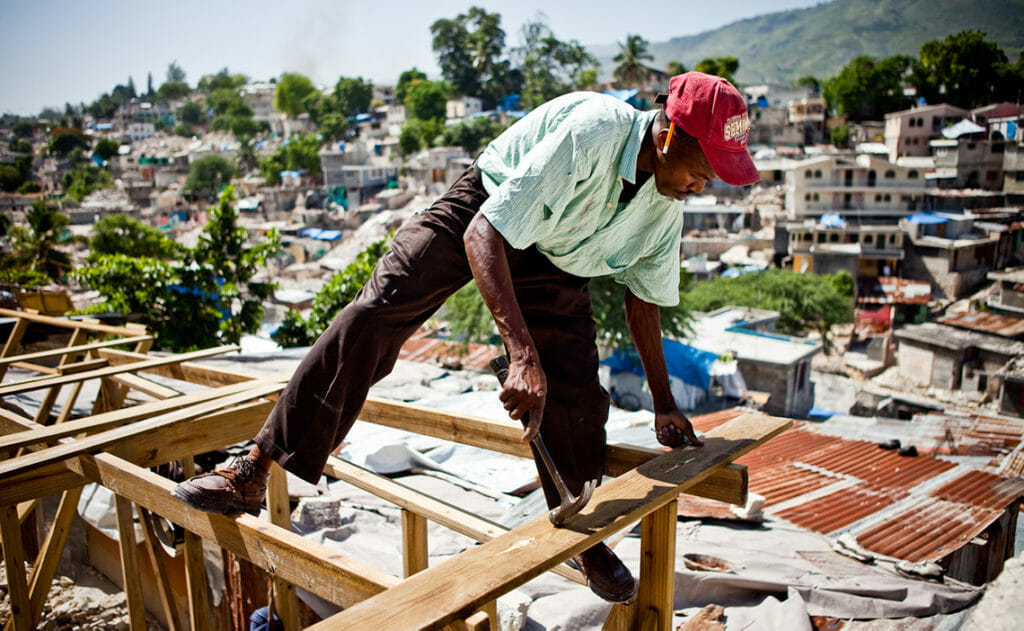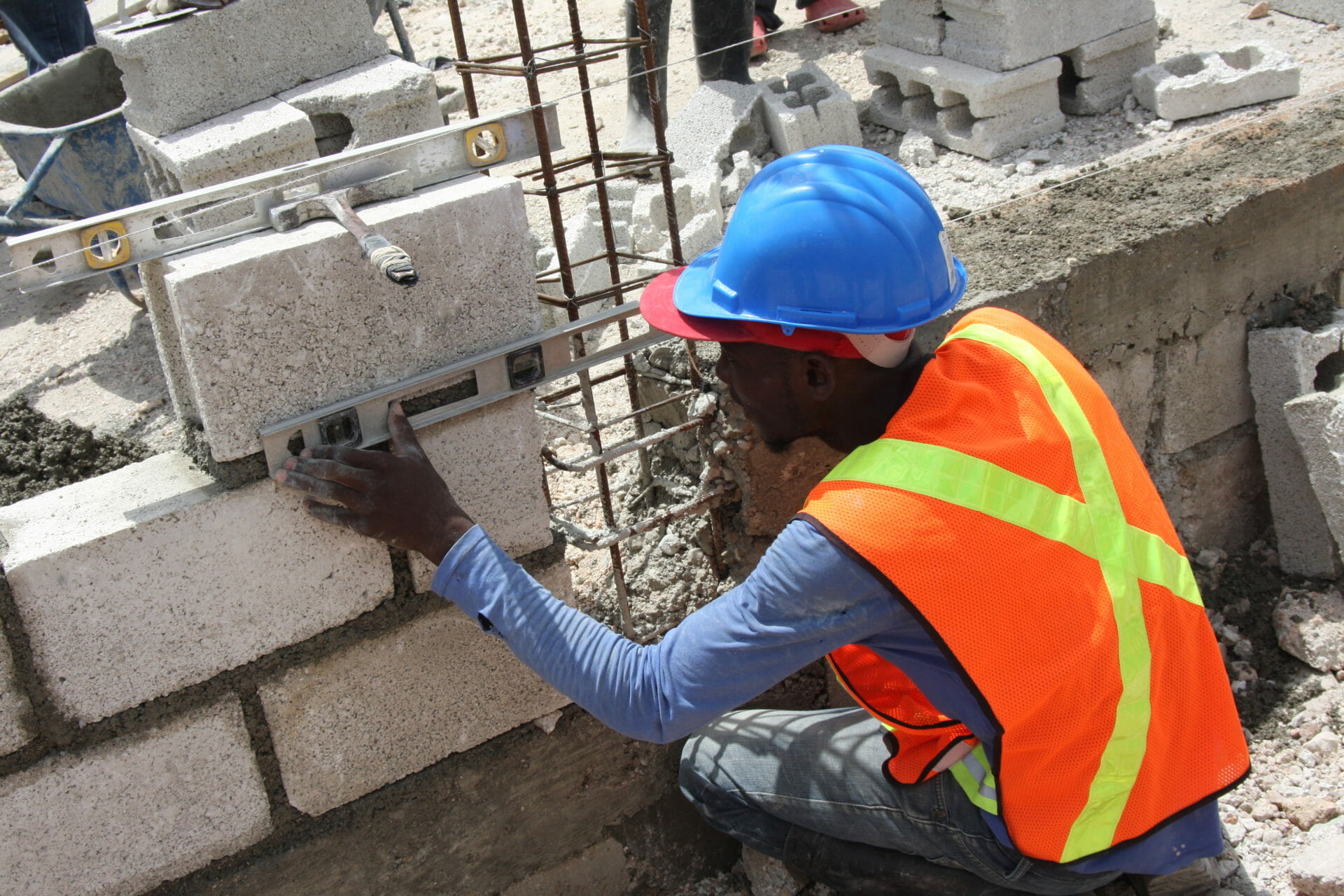Global Communities has worked with Haitian partners over many decades to improve infrastructure, from roads to markets to blood banks, and to build resilient communities with personalized, neighborhood-based solutions proven to last.
As one of the most densely populated countries in the Western Hemisphere, over half of Haitians reside in urban areas and 60 percent live under the national poverty line, facing inadequate supplies of potable water and poor sanitation systems. These challenges are exacerbated by ongoing natural disasters, as Haiti lies in the middle of the hurricane belt and is subject to severe storms, flooding and earthquakes.
On January 12, 2010, a 7.0 magnitude earthquake struck Haiti, resulting in the loss of more than 300,000 lives and significant destruction. Global Communities responded immediately, working in partnership with international agencies, the Haitian government, other non-governmental organizations and local communities to launch a major recovery program that focused on large-scale rubble removal and recycling, cash-for-work, construction of transitional shelters and an innovative, holistic disaster response called the Neighborhood Approach.
Since 2010, Global Communities has continued to implement development programs that aim to rebuild Haitian communities through participatory approaches and more resilient infrastructure to withstand environmental shocks and natural disasters.
KATYE gave us evenings. Before the earthquake, we didn’t sit outside and talk at night with neighbors. Now we have places to sit and lighting. The neighborhood feels safe and more social and friendly.
- KATYE study participant and Ravine Pintade resident
Recent Programs
Haiti World Bank Markets Program
As part of the continued rebuilding efforts in Port-au-Prince, Global Communities supported the rebuilding of four marketplaces in the Center Region of Haiti (Maissade, Thomonde, Mirebalais and Saint Raphael) and worked closely with individual municipalities and communities to create a governance structure for the overall management of each marketplace. (Ended 2021)
Building Safer Roads
The UCLBP/Avenue N program involved supervising road construction of Avenue N in the city of Port-au-Prince with support from the Agence Française de Développement. Global Communities was contracted by Unite de Construction de Logements et de Batiments Publics to provide quality control during the construction of Avenue N. (Ended 2019)
Building a Resilient Canaan
The Canaan Upgrading and Community Development (CUCD) program was funded by the U.S. Agency for International Development (USAID) and the American Red Cross and supported the Government of Haiti’s vision to promote equitable and resilient urban development in the Canaan zone, an emerging city north of Port-au-Prince where thousands of people were relocated after the 2010 earthquake. Global Communities implemented the livelihoods and physical renewal aspects of the program, while the American Red Cross was responsible for community mobilization. Together, the CUCD program partners successfully integrated Canaan residents into the wider electrical, water, road, banking, educational and labor networks of the country. (Ended 2018)
The Enabling Canaan Program reinforced the CUCD program with funding from the American Red Cross. Global Communities and Haitian partners designed and constructed essential, resilient infrastructure that prepares Canaan to withstand future natural disasters and attract investments that will improve the living conditions for its residents. These projects included a water distribution system, main thoroughfare, public school, community centers, public spaces, solar lighting and a banking center. This infrastructure complements the development of priority public service projects, including the expansion of the national electricity network and construction of a potable water system in Canaan. (Ended 2018)
Community Development & Housing in Caracol
The USAID-funded Community Development Program (CDP) for Caracol, also known as EKAM Housing Project, was implemented in the north of Haiti as one of several housing projects supporting the Government of Haiti’s efforts to provide housing following the devastating earthquake of 2010. Construction of 750 units designed to house families displaced by the earthquake and other vulnerable households was completed near the Caracol Industrial Park. The program offered lease-to-own housing contracts that provided security of tenure, water and sanitation systems, 24-hour electricity services and increased employment opportunities. Access to education was also made available through the construction of partner-financed primary and secondary schools. The project developed a sustainable social housing village where residents, stakeholders and partners have an equal sense of ownership through resident sensitization, operational and technical support for Government of Haiti entities, day-to-day site management and improvements, improved governance and community relations, established public private partnerships and social and economic activities. (Ended 2017)
Establishing the Haitian Red Cross Blood Bank
Global Communities built the National Blood Transfusion Center (NBTC) and Specialized Analysis Laboratory (SAL) in Port-au-Prince with funding from the American Red Cross. Global Communities worked alongside Edifica Sud/Genie Conseil consortium, which designed the blood transfusion center and the laboratory and supervised the site. The new blood bank will enable Haiti’s Ministry of Health to maintain a safe and sufficient blood supply service for Haiti’s 11 million people. Haiti now has an appropriate building to accommodate the NBTC/SAL located in an improved compound. (Ended 2018)
A Better Life in My Neighborhood
LAMIKA (Lavi Miyo Nan Katye pa’m Nan / A Better Life in My Neighborhood) was an integrated, urban neighborhood reconstruction and recovery program implemented in Carrefour-Feuilles, a residential neighborhood in Port-au-Prince. The area sustained extensive damage from the 2010 earthquake and experienced extreme poverty, dense housing and limited access to safe infrastructure and services. Funded by the American Red Cross, and in partnership with Build Change, this program enhanced community and household resiliency in targeted communities through a sustainable and integrated approach that provided socially cohesive, healthy, habitable and secure living spaces and conditions. The three core components of the program included social empowerment, economic strengthening and physical renewal. As a result, approximately 31,142 locals living in the Carrefour-Feuilles community and their families have access to new and improved access corridors, schools, electrical and water networks, public spaces, and roads in the LAMIKA zone, which significantly impacted the local economy. (Ended 2017)
KATYE & the Neighborhood Approach
Global Communities implemented the groundbreaking $8.6 million USAID-funded KATYE urban reconstruction program in the neighborhood of Ravine Pintade in Port-au-Prince. Instead of traditional disaster relief, Global Communities partnered with community leaders to create the conditions for sustainable recovery and rebuilding using a methodology known as the Neighborhood Approach. We believed that with the right voices at the table, we could meet immediate humanitarian needs while addressing the deeper challenges of pre-existing vulnerabilities, laying the foundation for a safer, healthier and more resilient neighborhood for years to come.
This innovative, integrated approach started with rubble removal and shelter building services, while working with the community on green spaces, plots for schools, and proper access roads to cover the basics of sustainable urban improvement. Community mobilization and trust-building were fundamental in the ongoing enumeration process, where local participation fostered consensus on the status of occupancy, tenure and family condition and needs, and in coming up with workable plans for temporary relocation of families while new shelters were built.
In 2018, Global Communities, then operating as PCI, returned to Ravine Pintade to conduct a rigorous follow-up study and analysis of the program. The study found the KATYE project increased the value of land and housing, increased the presence of small businesses and implemented drainage systems that significantly decreased flooding and mud that was common before the earthquake, which reduced vectors for disease. The temporary shelters erected by the program had been formalized into more permanent houses and had outlived their original intended lifespan by five years. The program's retaining walls, pathways, stairs and much of the water system continue to be maintained and appreciated. Community involvement was valuable in all aspects of the program and was the key to its sustainability. (Ended 2012)
Our Work in Haiti
Disaster Risk Reduction & Response
Mitigating Future Risks to Reduce Vulnerability
Early Recovery & Market Systems
Advancing Market-Based Recovery
Shelter & Settlements
Temporary Homes for Dignity, Safety and Privacy
Resilience
Enhancing Food Security, Sustainable Agriculture and Water Management in Climate-Affected Communities
Sustainable Development
Standing with Communities as They Shape Their Own Future
Emergency Response
Urgent Delivery of Lifesaving Services
Resources
Research & Publications
Humanitarian Assistance, Resilience, and Rebuilding: The Long-term Impact of the Neighborhood Approach on Post Earthquake Haiti
Summary of FindingsA Post-Project Sustainability Study of The KATYE Project The January 12, 2010 earthquake in Haiti was the largest natural disaster in the country’s history. Residents were confronted with a tragedy of monumental scale and the daunting task of building back. Among the hundreds of projects implemented in response to the disaster was the…
NEWS
Latest stories from the blog

Lessons from Haiti: How to build safer cities
By Flavie Halais This article was originally published on the Devex website. The multifaceted dimension of risk in Haiti has made it difficult for humanitarian …
Read More
Haiti Cholera Response
The 2010/2011 Cholera Prevention Initiative, under the post-earthquake OFDA-funded KATYE, promoted disease prevention in Port au Prince, Gonaives, Cap Hatien, Carrefour and Leogane. Over a …
Read More
Building back stronger in Haiti, neighborhood by neighborhood
In January 2010, Haiti was changed forever by a devastating earthquake. Within moments, entire neighborhoods crumbled, upending families and communities in the blink of an …
Read More
IOM Completes First Road to Massive Displacement Settlement in Haiti
IOM Completes First Road to Massive Displacement Settlement in Haiti This story was originally published by the International Organization for Migration. IOM, the UN Migration …
Read More
